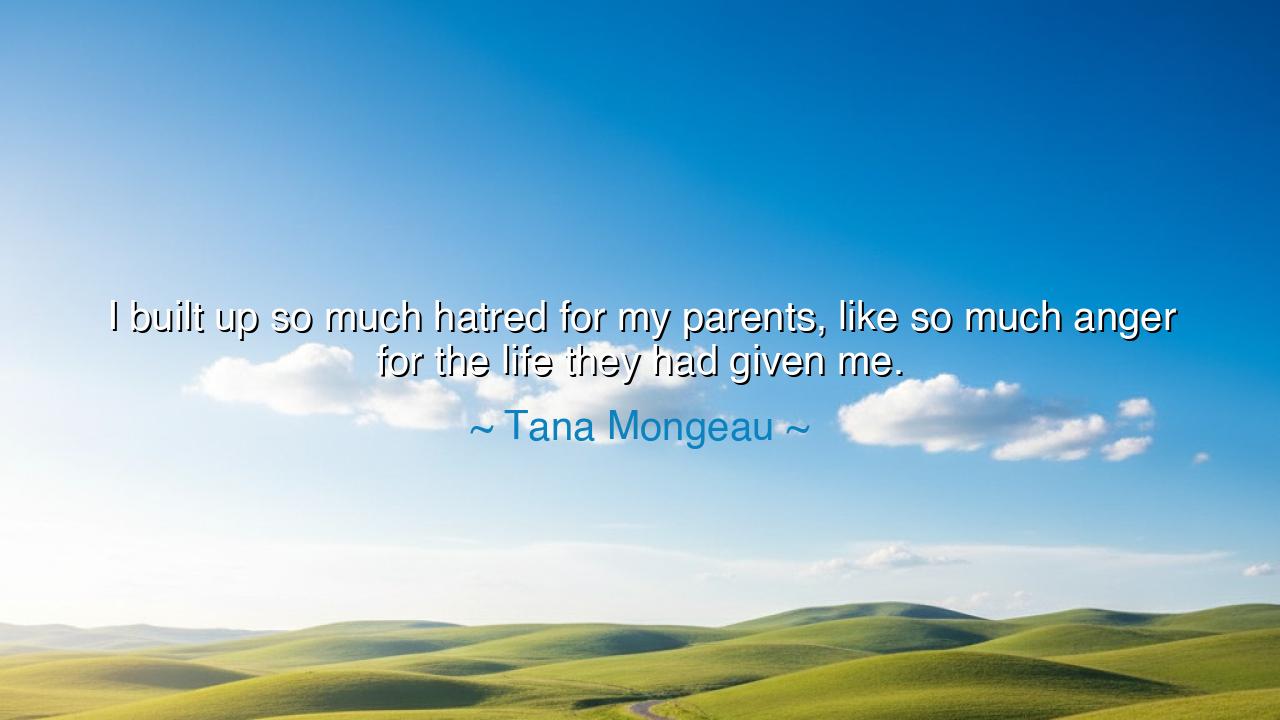
I built up so much hatred for my parents, like so much anger for
I built up so much hatred for my parents, like so much anger for the life they had given me.






Host: The room was quiet, the dim light of the evening casting soft shadows across the walls. Jack sat by the window, his fingers lightly tapping against the edge of his coffee mug, his mind clearly somewhere distant. Jeeny, across from him, was curled up in her chair, her gaze focused but seemingly far away. The silence between them was comfortable, but there was an unspoken energy in the air—something that invited deeper reflection.
Host: Tana Mongeau’s words drifted into the stillness: “I built up so much hatred for my parents, like so much anger for the life they had given me.” The rawness of the statement, the pain and the complexity of emotions behind it, felt like an invitation to talk about anger, family, and the way our past shapes who we become. Jack was the first to speak, his voice quiet but thoughtful.
Jack: “That’s heavy. The idea of building up so much anger—especially toward your parents, the ones who raised you, gave you the life you had. It’s hard to imagine how those feelings could develop, but I guess it makes sense, doesn’t it? When your life doesn’t turn out the way you thought it would, or when you feel like you didn’t get what you needed, that anger can take hold. It’s like it becomes a part of who you are, even if you’re not always aware of it.”
Jeeny: Her voice was soft, almost reflective, as she considered the words: “Exactly. It’s the expectations and the realities of our upbringing. We often don’t realize how much of our anger is tied to those expectations—what we thought we would get from our parents, the lives they gave us, and the ways we were shaped by their actions, their choices. The anger isn’t necessarily about them as people, but about the perceived limitations they put on us, or the ways we feel we were restricted by their influence.”
Host: The conversation seemed to take on a deeper tone, the quiet weight of Mongeau’s words settling between them. The idea that anger toward our parents could stem not just from their actions, but from the expectations we place on them, was both complex and deeply relatable. Jack’s usual skepticism about emotions seemed to soften as he considered how often people carry unacknowledged anger from their past.
Jack: His voice softened, almost vulnerable now: “I think that’s what makes family so complicated, isn’t it? The anger, the resentment—it’s not always about the actual actions, but about what we feel we missed, what we didn’t get. And sometimes, we don’t know how to process those feelings. It becomes easier to place the blame on them, on the life they gave us, rather than confronting what’s really at the root of it—our own expectations.”
Jeeny: She smiled gently, her voice calm and filled with understanding: “Exactly. And it’s easy to carry that anger without really understanding where it comes from. We don’t always see how our parents did the best they could, with what they had, with the tools they were given. But it’s not always about seeing them as perfect. It’s about understanding that their choices shaped us, and that anger is a response to the disconnect we feel between what we needed and what we received. But it’s also a reminder of the ways we can grow beyond those feelings, of how we can shift our perspective.”
Host: The room felt a little quieter now, as though the weight of their words had created space for reflection. The conversation had shifted from just anger to understanding, not just for the anger itself, but for the process of coming to terms with the past. Jack, once more reflective, seemed to have come to a deeper understanding of the way expectations, anger, and family are interwoven.
Jack: His voice was softer now, almost as if he had come to terms with something: “I think the hardest part is forgiving, isn’t it? Forgiving not just our parents, but ourselves—for feeling anger, for holding on to it. It’s so easy to stay in that place of resentment, thinking it’s the only thing we have to hold onto. But it’s not. Letting go of the anger doesn’t mean we forget, it just means we stop letting it control us.”
Jeeny: Her voice was reassuring, warm with understanding: “Exactly. The anger is part of the process, but it doesn’t have to define us. Forgiveness isn’t about excusing the past—it’s about giving ourselves permission to move forward, to heal. When we let go of that anger, we make space for new things—new perspectives, new understandings, and new ways to love.”
Host: The evening stretched on, the world outside growing darker, but inside, there was a shift—a quiet peace in the realization that anger, while an inevitable part of the human experience, didn’t have to define our relationships or our futures. Jack and Jeeny sat together, understanding that even in the most painful moments of our past, there is always room for growth, for healing, and for releasing the hold that anger has over us.






AAdministratorAdministrator
Welcome, honored guests. Please leave a comment, we will respond soon